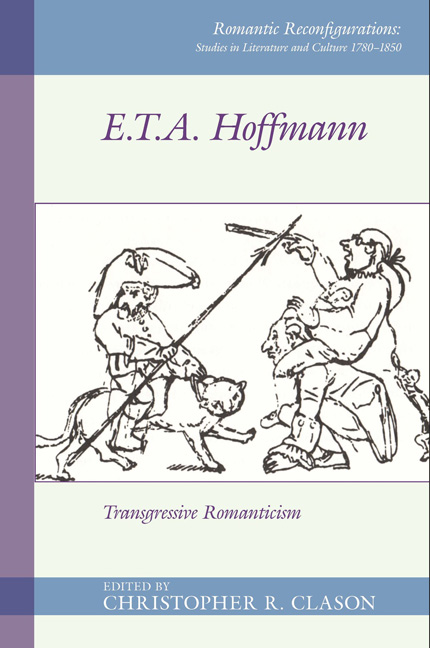Book contents
- Frontmatter
- Contents
- List of Figures
- Acknowledgements
- Notes on Contributors
- Introduction
- I Transgression and Institutions
- II Transgression and the Arts
- III Transgression in the Märchen
- 7 Transgressive Play and Uncanny Toys in E.T.A. Hoffmann's “Das fremde Kind”
- 8 Attending to the Everyday: Idiosyncrasy in E.T.A. Hoffmann's “Der goldene Topf”
- 9 Prinzessin Brambilla: The Aesthetic between Public and Private
- IV Transgression of Reception in Kater Murr
- Works Cited
- Index
8 - Attending to the Everyday: Idiosyncrasy in E.T.A. Hoffmann's “Der goldene Topf”
from III - Transgression in the Märchen
- Frontmatter
- Contents
- List of Figures
- Acknowledgements
- Notes on Contributors
- Introduction
- I Transgression and Institutions
- II Transgression and the Arts
- III Transgression in the Märchen
- 7 Transgressive Play and Uncanny Toys in E.T.A. Hoffmann's “Das fremde Kind”
- 8 Attending to the Everyday: Idiosyncrasy in E.T.A. Hoffmann's “Der goldene Topf”
- 9 Prinzessin Brambilla: The Aesthetic between Public and Private
- IV Transgression of Reception in Kater Murr
- Works Cited
- Index
Summary
In the fourth chapter of E.T.A. Hoffmann's “Der goldene Topf” (“The Golden Pot,” 1814) the narrator begins to collapse the familiar world – the “everyday lives of ordinary people” – with the “fairy realm of glorious wonders” – a place revealed to us in dreams (GPOT 20). Surprisingly, the act of revelation or dreaming that foists us into the spiritual realm is more likely to occur than our perception of the world around us – at least, the narrator depicts this paradox in his own struggle to write. If he ostensibly desires to recount the extraordinary story of the student Anselmus, his articulated goal is countered by the surprising appeal with which he ends the passage. Rather than requesting our belief in the fantastic elements of his tale, he asks that we learn “to recognize the well-known shapes that, as the saying goes, cross your path every day” (GPOT 20). His difficulty derives, then, not from the extraordinary nature of Anselmus's recent history – his encounters in the preceding three vigils with the magical green snakes and the shape-shifting door-knocker, for example – but from an attempt to re-discover the phenomena of our own familiar world, the ordinary appearances of characters who, like the Sub-Rector Paulmann and Registrary Heerbrand (to take the narrator's own examples), may still stroll about our city streets. The expected, categorical difference between the ordinary and the extraordinary vanishes: if the narrator cannot persuasively re-visualize Anselmus's existence, then this failure also obscures our perception of persons still visible in our familiar world, consequently drawing a parallel between the reality of the narrative's extraordinary events and the reality of characters existing in our concrete present. Exploring this parallel as constitutive of the “everyday,” “Der goldene Topf” suggests that the “common” phenomena “met with every day” are an amalgamation of the ordinary and the extraordinary.
I argue that the narrator's intense concern with identifying familiar characters indicates an investment in the ordinary as idiosyncrasy: the juxtaposition of particular and type occurring in a moment of distinctness. This is first evident in the consistent denomination of characters by both particular name and typifying title: “the student Anselmus,” the “Sub-Rector Paulmann,” the “Registrary Heerbrand,” and, later, the “Archivist Lindhorst.”
- Type
- Chapter
- Information
- E. T. A. HoffmannTransgressive Romanticism, pp. 151 - 168Publisher: Liverpool University PressPrint publication year: 2018



